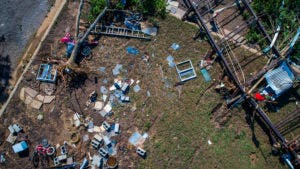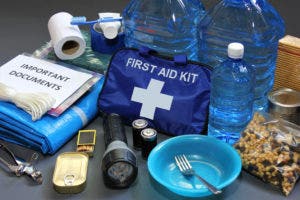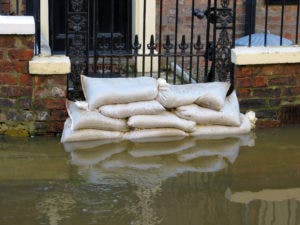Is Your Party Rental Company Ready for Hurricane Season?
For tens of millions of Americans living in the Gulf of Mexico region, the Caribbean, and along the East Coast, hurricane season is a period during which the meteorologist on the evening news gets a little more attention than usual. Especially when there’s a potential storm forming somewhere in the Atlantic ocean, just off the coast of the United States.
It might be an understatement to say that most people don’t really prepare for hurricanes, even those who live directly in their path. Hurricane preparedness is something most Americans put off until the storm is already brewing.
We tend to be focused on protecting our families and our homes. That’s what matters most, after all. Stockpiling food and water, barricading windows to withstand maximum sustained winds, checking the National Hurricane Center’s website for updates, that’s all part and parcel. But with so much last minute prep on the home front, are you leaving yourself ample time to prepare your party rental company as well?
Some of you work from home. You store your equipment in your personal garage or elsewhere on your property. But some of you work out of other locations, like leased garages, warehouses, or storefronts. And if you’re waiting to prepare for major hurricanes until they’re already barreling toward you, you may not be leaving yourself enough time to safeguard your livelihood.
It’s Not Just the Hurricane You Need to Worry About
 It’s not just people in hurricane zones that need to be worried about hurricanes and tropical storms. Hurricane season can create hosts of terrifying weather events, even in areas not traditionally impacted by those storms.
It’s not just people in hurricane zones that need to be worried about hurricanes and tropical storms. Hurricane season can create hosts of terrifying weather events, even in areas not traditionally impacted by those storms.
Sometimes, the people hardest hit by hurricanes never expect a hurricane at all. My hometown of Binghamton, New York—about three and a half hours from TNT headquarters in Buffalo—learned the hard way that hurricanes and tropical storms can have catastrophic consequences.
In 2011, Binghamton was severely flooded by the remnants of tropical storm Lee. The flooding inundated much of the Binghamton metro area. And despite flooding in 2006, few in Binghamton anticipated the 2011 flood, or understood that a tropical storm could have such a devastating impact on a region, especially given its initial landfall was in the Gulf of Mexico. We had gotten leftover rain from tropical storms before, but never anything like that.
How Does Your Company Prepare for Hurricane Season?
It goes without saying that protecting your family, your home, and yourself during a hurricane or tropical storm will be your number one concern. There are invaluable resources available online for helping you accomplish that goal, too. But what about your company? What steps can you take to safeguard your valuable equipment and other assets?
Step I - Develop a Plan Before Hurricane Season Begins
The first step in preparing for hurricane season is the same first step as most other avenues of your company’s operations. Planning. It may surprise you to see just how big an impact planning can have as you deal with the logistics of hurricane preparation.
During this critical first stage, you should:
- Take a full inventory of your company’s assets. This should include big stuff, like vehicles and commercial inflatables and party tents, and smaller things, like tent stakes and other accessories. If you already have an inventory, update it. If you don’t have one, create one.
- Identify your mission-critical assets. Which bits of equipment are your most important? What should you be protecting the most? This may not necessarily mean your most expensive equipment, either. Your most popular rental units may generate more income directly than ones three times as expensive. Figure out which of your assets are the most important for your company’s operations and profitability.
- Communicate with insurance providers and learn about your coverage and liabilities. If you’re unsure about anything, don’t be afraid to ask them. Make sure you have adequate coverage as best you can.
- Develop an emergency plan. If you’re forced to evacuate during business hours,
- How will employees be notified? Where will everyone go? Do you have evacuation routes mapped out?
- What is the procedure for closing the business down for a hurricane?
- What steps do employees need to take to fortify your business property in the event of a hurricane
- Have you created easily-accessible checklists employees can use to simplify the process of fortifying your property? This would help ensure everything gets done and that no one is forgetting anything.
Step II - Protect Your People
Your most valuable assets aren’t bounce houses or pole tents. They’re people. Your employees make your company what it is.

It’s important you take the time to update employee contact information so you can easily reach your staff in the event of a hurricane. You should be able to reach their emergency contacts easily, too. And be sure to test those phone numbers and make sure you can reach everyone you need to reach, too.
Your full staff should rehearse your emergency plan exhaustively. Your staff should be able to quickly and efficiently lock down the company’s full operations and evacuate your facility smoothly, while securing your physical assets in the process. If your guys can’t do that, drill with them occasionally until they can.
Drills and role playing might be a little cheesy, but they’re extremely effective. That’s why first responders and the military use them. If they’re good enough for police, fire fighters, paramedics, surgeons, and soldiers, they’re good enough for your business.
Step III - Fortify Your Property & Assets
With your staff taken care of, focus now on securing your physical property and your company’s assets. During this step you should …
 Have all of the equipment necessary to board up windows and doors
Have all of the equipment necessary to board up windows and doors- Prepare to deploy sandbags and tarps along the bottoms of doors, garage doors, and other entry points to keep minor and more moderate flooding at bay
- Make sure drainage systems and gutters are free of debris and fully operational
- Make copies of your important data. Receipts, invoices, customer contact lists, vendor contact info, and other important information should be backed up and stored somewhere safely, with additional offsite records as well. We recommend using cloud-based digital services like Google Drive or Dropbox so your data is always safe, no matter where a hurricane hits.
- Use ratchet straps and tarps to cover and firmly secure outdoor assets. If you have rolled up rental units outside or if your property has small sheds or similar non-permanent structures, secure these items to the ground firmly and use your tarps to keep them dry. Should those items come loose, they can vastly increase property damage in high winds. If you can fit it inside, do!
- Check fire safety equipment like extinguishers, sprinkler systems, smoke alarms, etc. and make sure everything is up to date and functional
Step IV - Develop a Recovery Plan
In the wake of a hurricane, the services of a party rental business aren’t really at the top of anyone’s agenda. You’ll have a little more downtime than most other businesses. But this gives you the advantage of having more time to roll out and fully implement your recovery plan.
Your hurricane recovery plan should include …
 A list of contractors you can bring in for repairs to your property. This list should include carpenters, plumbers, masons, etc. and you’ll want at least three or four reliable, well-reviewed options in case some contractors are booked or are unable to reach your facility.
A list of contractors you can bring in for repairs to your property. This list should include carpenters, plumbers, masons, etc. and you’ll want at least three or four reliable, well-reviewed options in case some contractors are booked or are unable to reach your facility.- Call employees and see if they’re okay or if they need help. Gauge if they can safely come in, but keep in mind their families are more important to them than the business.
- Clean up and repair your property. Contact authorities or utility providers should you come across downed power lines, blown water mains, etc.
- Are there any repairs you and your available employees are qualified to do on your own? This is a good time for safe DIY projects. Just be careful!
- Review your company’s assets and inventory. If anything is damaged or destroyed, you can use this unfortunate downtime to communicate with insurance providers and vendors to replace and replenish your stock.
- Floor dryers and commercial dehumidifiers are lifesavers when cleaning up from a hurricane!
- Have some down time? Is your van / truck still working? Use it to help out your family, friends, neighbors, and customers. Not for marketing purposes or as a PR stunt. It’s just good to help others, and it might provide you with some peace of mind at a time when everything else feels upside down. Besides, it’s just a good thing to do.
Hurricane Season Prepares You for Disasters All Year Round
If a storm does head toward your town, you’ll sleep a whole lot easier knowing your company is as prepared as possible. Your employees have evacuation plans and can be reached, your physical property is locked down and secured, your assets are as safe as reasonably possible, and you have plans for recovery should the storm live up to the hype.
All that’s really left is to monitor the storm. Watch for path changes and gauge what sort of power they’re predicting. And don’t rely on only one source of information, either. Try to gather predictions from multiple sources and see what various experts have to say about the hurricane.
It’s better to be over-prepared for a hurricane that never comes than to be under-prepared for one that does. And your hurricane preparations are good for year-round events and disasters, too.
Hurricane zones—the East Coast, the Gulf Region,the Caribbean, and up to 100 miles inland—run the full gambit of US climates and weather phenomena. Flooding, tornadoes, snow storms, earthquakes, wildfires … you name a natural disaster, and you’ll find instances of them happening inside hurricane zones. So don’t think of these hurricane season preparations as only being for hurricanes. All of this hard work might just save your business from something that isn’t a hurricane at all.


